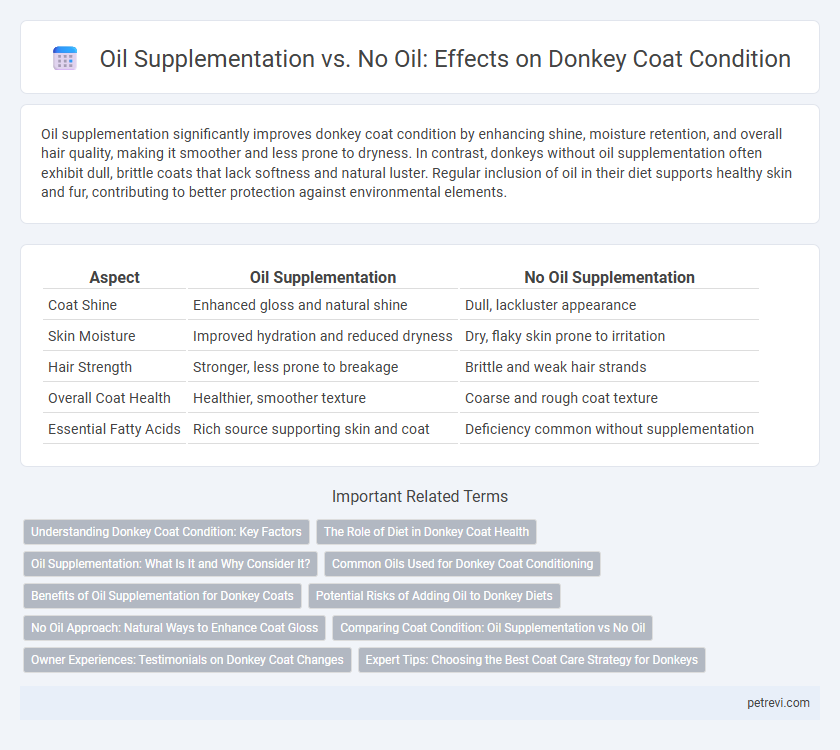Oil supplementation significantly improves donkey coat condition by enhancing shine, moisture retention, and overall hair quality, making it smoother and less prone to dryness. In contrast, donkeys without oil supplementation often exhibit dull, brittle coats that lack softness and natural luster. Regular inclusion of oil in their diet supports healthy skin and fur, contributing to better protection against environmental elements.
Table of Comparison
| Aspect | Oil Supplementation | No Oil Supplementation |
|---|---|---|
| Coat Shine | Enhanced gloss and natural shine | Dull, lackluster appearance |
| Skin Moisture | Improved hydration and reduced dryness | Dry, flaky skin prone to irritation |
| Hair Strength | Stronger, less prone to breakage | Brittle and weak hair strands |
| Overall Coat Health | Healthier, smoother texture | Coarse and rough coat texture |
| Essential Fatty Acids | Rich source supporting skin and coat | Deficiency common without supplementation |
Understanding Donkey Coat Condition: Key Factors
Donkey coat condition is heavily influenced by diet, where oil supplementation provides essential fatty acids that improve skin hydration and hair luster compared to no oil intake. Fatty acids such as omega-3 and omega-6 found in oils enhance the barrier function of the skin, reducing dryness and promoting a healthy, glossy coat. Without oil supplementation, donkeys may experience dull, brittle hair and increased susceptibility to skin issues due to insufficient lipid intake.
The Role of Diet in Donkey Coat Health
Oil supplementation enhances the fatty acid profile of a donkey's diet, promoting a shinier, healthier coat by improving skin hydration and reducing dryness. Diets lacking oil often result in dull, brittle hair due to insufficient essential fatty acids that support cellular repair and barrier function. Adequate inclusion of oils rich in omega-3 and omega-6 fatty acids is critical for maintaining optimal coat condition and overall skin health in donkeys.
Oil Supplementation: What Is It and Why Consider It?
Oil supplementation for donkeys involves adding vegetable oils such as flaxseed, soybean, or canola oil to their diet to enhance coat condition by providing essential fatty acids like omega-3 and omega-6. These fatty acids support skin health, reduce dryness and inflammation, and promote a shiny, smooth coat, especially useful in cases of poor coat quality or seasonal shedding. Research indicates that donkeys receiving oil supplements exhibit improved coat texture and moisture retention compared to those without oil supplementation.
Common Oils Used for Donkey Coat Conditioning
Common oils used for donkey coat conditioning include coconut oil, olive oil, and linseed oil, each offering unique benefits such as moisturizing, softening, and enhancing shine. Studies show that oil supplementation improves coat texture, reduces dryness, and promotes healthy skin compared to no oil application. Choosing the right oil depends on factors like coat type, skin sensitivity, and specific nutritional needs of the donkey.
Benefits of Oil Supplementation for Donkey Coats
Oil supplementation significantly improves donkey coat condition by enhancing hair shine and softness through essential fatty acids and vitamins such as Vitamin E. Studies indicate that oil supplements like flaxseed or sunflower oil contribute to better moisture retention and reduced skin dryness, promoting a healthier, more resilient coat. Improved coat quality reduces the risk of skin irritation and supports overall donkey wellbeing by maintaining optimal skin barrier function.
Potential Risks of Adding Oil to Donkey Diets
Adding oil to donkey diets can improve coat condition by enhancing shine and softness, but excessive oil supplementation poses potential risks such as digestive upset, including diarrhea and colic. High-fat intake may disrupt the natural microbial balance in the hindgut, leading to poor nutrient absorption and metabolic disturbances. Careful management of oil quantity and quality is essential to avoid negative impacts on overall donkey health and coat condition.
No Oil Approach: Natural Ways to Enhance Coat Gloss
Focusing on a no-oil approach for enhancing donkey coat condition involves prioritizing natural dietary components such as omega-3 fatty acids from flaxseed and chia seeds, which promote healthy skin and a glossy coat. Regular grooming and adequate hydration are essential practices to remove dirt and distribute natural oils evenly across the coat. Ensuring a balanced diet rich in vitamins A, E, and biotin supports overall coat health without the need for external oil supplementation.
Comparing Coat Condition: Oil Supplementation vs No Oil
Oil supplementation in donkeys significantly enhances coat condition by increasing shine, softness, and moisture retention compared to no oil supplementation. Studies indicate that donkeys receiving oils rich in essential fatty acids, such as flaxseed or fish oil, exhibit reduced dry skin and fewer patches of roughness. In contrast, donkeys without oil supplementation often display dull, brittle coats prone to flaking and irritations.
Owner Experiences: Testimonials on Donkey Coat Changes
Donkey owners report noticeable improvements in coat texture and shine after incorporating oil supplementation into their diet, often highlighting increased softness and reduced dryness compared to no oil regimens. Testimonials emphasize enhanced skin hydration and a healthier glow, attributing these changes to essential fatty acids found in oils such as flaxseed, coconut, and fish oil. Contrastingly, donkeys without oil supplementation frequently exhibit duller, rougher coats with persistent flaky skin issues.
Expert Tips: Choosing the Best Coat Care Strategy for Donkeys
Oil supplementation enhances donkey coat condition by improving moisture retention, shine, and softness, which experts recommend for dry or dull coats. Choosing high-quality oils rich in omega-3 and omega-6 fatty acids, such as flaxseed or fish oil, supports skin health and overall coat vitality. Regular application combined with balanced nutrition yields optimal results compared to no oil supplementation, ensuring a healthy, glossy coat.
Oil Supplementation vs No Oil for Donkey Coat Condition Infographic

 petrevi.com
petrevi.com